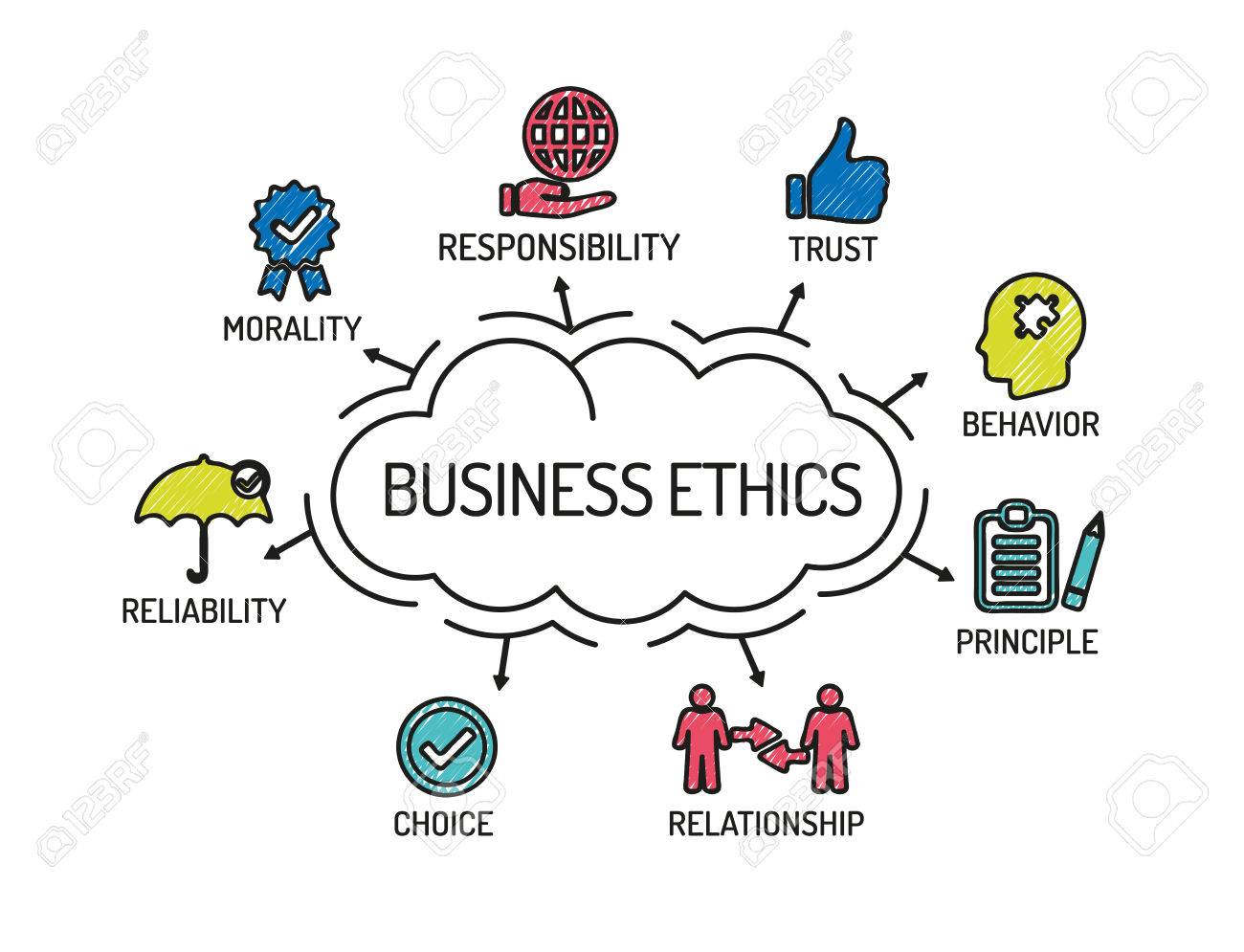
Is ethics one of the critical factors for every business?
Ethics is one of the critical factors for every business. Ethics in business is knowing the difference between what you have a right to do and what is right to do.

“Ethics is knowing the difference between what you have a right to do and what is right to do.”— Potter Stewart
Have you ever allowed ethics to crawl down to your personal life? Most of you might have tried to do what you felt right. We know. But sometimes we need to follow certain ethics in our life.

Why are ethics critical factors for every business?
Ethics is a collection of rules and principles, describes what is right for individuals and society. It is also described as a moral philosophy.
Just like following ethics can have a significant impact on your life, they can influence a business’s success in big ways. Your business can offer excellent services or innovative product, but with questionable ethics, it might not even matter. Good business ethics are essential to companies for several reasons, and they are:
“A man without ethics is a wild beast loosed upon this world.”
— Albert Camus
 The reason why Good business ethics are necessary for companies?
The reason why Good business ethics are necessary for companies?
- Ethics Improves the Reputation of your business
Business ethics help make sure a good reputation for your firm. Not only does it feel great to be part of a firm with a good reputation, but it’s great for business. When you have recognition for continuously being ethical in how you source and build products, and treat your team members, customers and the community, more people will want to do business with you.
It means you will appeal to a variety of people and companies that will be great for boosting your business, such as:
- Clients and customers who believe in your firm and want to support it
- Trade and community organisations who wish to you as a member
- Investors who want to help your company grow
- Communities who want to host your business or events
- Other companies that want to partner with you
- Magazines, newspapers, and other media who want to offer special recognition to you.
Even social media ethics is vital for your reputation.
- Business ethics help you retain top talented employees
Critical factors for business start at the top. If you are an employer or business owner, it’s essential to lead by example. When your employees see you making ethical choices, it allows them to know that they can have confidence in your firm; they know that you’ll do right by them and your customers. It boosts morale, and as word spreads about how you treat employees well, you will draw in good workers. Having strong rates of employee retention will help you save time and money on recruitment and training.
“Work ethics eliminates fear.”
— Michael Jordan
- Builds a Positive Corporate Culture
An organization devoting resources to developing policies and procedures that encourage ethical actions creates a positive corporate culture. The morale of your team members improves when employees feel protected against retaliation for personal beliefs. These policies include anti-discriminatory rules, open-door policies and equal opportunities for growth. When employees feel good about working for you, the overall feeling in the organization is more positive. It breeds organizational loyalty and productivity because employees feel good about showing up for work.
- Limit Risk with Good Business Ethics
Businesses that practise good business ethics encounter less risk for fines and other legal issues. Sure, the law and regulations are complex, but you can avoid much trouble just by doing what is morally right. Keep that in mind while making business decisions. Then, you can save the stress of having to defend your firm against lawsuits and fines.
- Boosts Consumer Confidence
An organization can lose consumer confidence easily with a few bad online reviews. So, every organization have to preserve consumer loyalty through ethical practices that start with fair and honest advertising techniques before going through the entire sales process. One area that firms can lose consumer confidence is failing to honour guarantees or deal negatively with customer complaints. It is why consistent policies and employee training is imperative. Companies must give directions to employees on how to treat customers according to their core values.
- Reduces Financial Liabilities
Those companies don’t develop policies on ethical standards, risk financial liabilities. The first liability is a reduction in sales. For example, a company that deals with real estate development can lose customer interest and sales if its development reduces the size of an animal sanctuary. It doesn’t mean a company must abandon growth. But, adopting ethical responsibilities is essential for your business to sway public opinion away from corporate greed and toward environmental responsibility.
Overall, when the team members and executives at all levels of a firm make critical factors for business, it’s good for the company. All the factors above help the company grow to have bigger profits and a strong bottom line.
“If ethics are poor at the top, that behaviour is copied down through the organisation.”
— Robert Noyce

.

How to hire the best salespeople? – Golden tips for small scale business

Best Salespeople are not found at the click of a mouse. The search for Best Salespeople is similar to finding the needle in a haystack. Best Salespeople are the boon and back boon for every company.
Salespeople are one of the essential parts of a small scale business that deals in sales. They are the one who truly gets the business running. Hence, hiring them is one of the most crucial steps you will have to take as an employer. If you make a mistake here, you might very well join with those small businesses that fail because of not having the right team. But to recruit the best salespeople, you need to know exactly what makes them the best as well as find ways to lure them to your company as offering exorbitant pay is, most likely, out of your reach.

How to Recruit the Best Salespeople: 3 Tips for Success

- Know what makes the best salespeople
The first thing you should do to hire the best employees is to define a profile of your perfect salesperson. In this particular case, you should start by researching what features the true sales wizards have. Then, come up with a few interview questions that will help you determine whether the candidate owns those character traits.
However, you shouldn’t forget that having those character doesn’t wholly make one a good salesperson. To thrive in this profession, one must also have a burning desire for it and a competitiveness streak a mile wide. Account for this in your interview, and try to run some simulations or at least observe the new recruits keenly during the trial period to see if they perform their talent.
And if they don’t, think again and again about whether you should be working to develop and realise that potential or recruit someone else. While the former option is more promising, business is ruthless, and now one needs a good team to succeed and win the time to nurture the talent in the future.
- Hire the best salespeople by tempting them with benefits
The good news for small scale business owners all over is that today’s employees are more interested in benefits than in salary. Therefore, once you find the best candidate for your sales team, you can win him over by offering attractive benefits even if you can’t afford to offer them an excellent salary package.
Do you wonder how you can manage to offer competitive benefits to your people? The answer is simple; you don’t need to afford this. What you need is to get suitable PEO providers. They are Professional Employers Organizations that recruit people on behalf of small scale businesses. As this is the sort of thing they specialise in, these firms provide a broad range of benefits and perks that can help you entice the best salespeople.
Another benefit that a small scale business gets from working with PEOs is tax reduction. Technically, these people won’t be your employ. Hence, you won’t have to pay extra charges that usually come with expanding your staff. It might allow you to add more people or to give a raise to your team.
- Avoid the three greatest mistakes while hiring the best salespeople
Three greatest mistakes employers might make when hiring the best salespeople are:
- Failing to describe a highly precise salesperson profile for your business
- Poaching salespeople from your competitors
- Trying to recruit carbon copies of the successful employees you already have
The entire problem with the profile should be resolved at the beginning because you’ll need to develop it to find the best salespeople in the first place. But you will need to expand it and outline what exactly will determine “success” in the context of your business. Those must be clear goals that your new recruits will need to achieve to stay on the team.
Other errors are easy to make because both options are tempting. However, remember that a person you poached might be poached from you just as easily. And trying to find someone “just like our sales rep of the year” means you are closing yourself off to new talent.

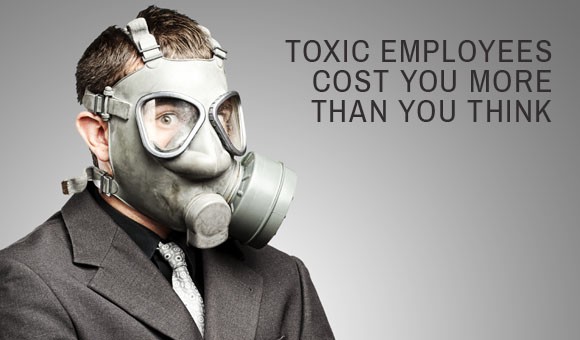
How to avoid the deadly consequences of toxic Employees?
Toxic employees will create a menace in the workplace. To eliminate the Toxic employees at the grassroots is a must for any employer who is seeking a positive growth in the company.

“Encourage a positive work environment where people share helpful stories about work and motivate each other to reach a common goal” Shawn Lim
Have you discover that one person on your team — the bad apple who has nothing positive to say, who riles up other team members and makes work life miserable. These toxic employees have a greater impact on your business.
- They increase the stress level of those around them and decrease overall job satisfaction.
- For the organization as a whole, a toxic employee decreases morale, productivity, and the quality of the work product.
- For women, toxic employees have an even greater detrimental effect. 10% more women reported toxic employees to increase their likelihood to leave a job than their male counterparts.
If you can’t terminate him, how do you respond to his behaviour? What feedback will you give him? How do you alleviate the damage he inflicts?
Understanding how to manage toxic employees will help you make the experience as painless as possible for yourself and your team. The first thing is to address the employee immediately before the negativity spreads.
“Leadership is not about being in charge. Leadership is about taking care of those in your charge.”Simon Sinek
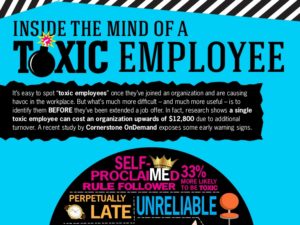
How to manage negative employees?
- Do your homework
The moment you sense negativity in the air, take the time to learn about the professional and personal situation of the employee.
- Are there any outside influences causing him to act more negative than usual?
- Or has this negative behaviour been present since the beginning?
Part of your role as an employer is to avoid writing a personal narrative about an employee based on assumptions. Conduct your due diligence to address the situation adequately.
- Conduct Damage Control and Document
A negative employee can do exponentially more harm to the morale of a team with each day that passes. Address the situation immediately with the employee. In preparation, make a note on how the employee’s behaviour is affecting the team dynamic. Document examples and apply them to illustrate the issue in regular management meetings with the employee.
- Be positive
Don’t let a toxic employee drag you down. It’s essential to set a positive tone going into your discussion. If you use a negative approach to them, they are more likely to get defensive and argumentative. So, give them examples of positive things they can do to improve themselves. Don’t just tell them about their wrong actions. Provide them with the tools and resources necessary for improvement.
Lead by example and avoid office gossip about that employee. Everyone needs to vent, but you are there to set the tone for a positive environment while actively resolving the situation. Every situation is different. Put yourself in their shoes. How would you like the news presented to you?
Pitch your anticipated conversation as a “quick chat.” Avoid language that may suggest punishment, such as a “disciplinary meeting.”
“One of the keys to avoiding gossip is to learn how to change the subject of your conversation.”Shawn Lim
- Reinforce the desired behaviour
Have you ever heard that management is just like parenting? Much like redirecting the negative responses of a toddler by praising their good choices, managers should give positive feedback whenever they notice their negative employee displaying the desired workplace behaviour. You are part manager, part therapist, part parent.
- Know when enough is enough
Have you successfully done all of the above, and still, negativity persists? Then, it’s time to put the person on a PIP or performance improvement plan and consider terminating him. Use the documentation you assembled during your exploratory phase to build a case for his termination. And please, we implore you, if all these are happening in the first ninety days, part ways! Hire slow, fire fast.
Being prepared to handle negative employees will help you act swiftly and efficiently when the situation occurs. If you have enough confidence and tools to take action, it will earn you more credibility as a leader. It results in a more positive workplace environment.
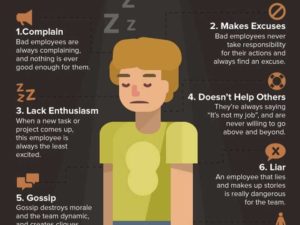
“If you’re brave enough to say goodbye, life will reward you with a new hello.”Paulo Coehlo

What are the best ways to cultivate creativity in the workplace?

Creativity in the workplace is about accelerating productivity in an organisation in an organic way. Creativity in the workplace is intelligence having fun.
Are you managing a start-up, a small or a large business? Then, it’s no secret that fostering creative thinking within the workplace is vital to the growth and success of your company.
With the increasingly complex problems, your business faces every day, sometimes, the same tired concepts and means to resolve problems just won’t cut it anymore. Employees expect to solve these problems by their leader, but do you think ideas coming from only one person can do so much.
That is why a creative environment is important. A workspace filled with creative thinkers will contribute innovative solutions and develop better ways to do things.
Nurturing creativity in a workspace with the daily hustles and bustles of an ordinary office environment can be a highly challenging task for leaders. It will get filled with workloads and deadlines that leave no room for creativity.

Six ways to encourage creativity in the workplace

- Leverage freedom and diversity
Give your employees the freedom to work towards a particular work goal using any method they want to follow. Always dictating the specific ways to do things will only smother their creativity. Assign a fixed work goal to them and allow them to use their own methods to accomplish it. Leverage diversity by building teams composed of diverse creative minds that have different perspectives and take on things. A group consisting of employees with distinct points of view is most likely to come up with innovative solutions as opposed to a homogenous group where there isn’t much assortment of ideas.
- Provide enough resources
Time and money are essential resources for optimising creativity. But, certain projects can get achieved by requiring only a little or none of both. Deadlines can either suppress or strengthen creativity, and a limited budget might cause to compromise the quality. So, provide just enough resources to support your team in achieving their assigned work goal.
- Discourage politics
Ensure to pick the best ideas based on their value and appropriateness, not on hierarchy. If your team members, no matter what position, feel like they have the opportunity to contribute to the success of the company, they will feel more encouraged to contribute ideas more often.
- Keep the door open for new or innovative ideas
Creative thinking of your employees is worthless if they feel like their ideas aren’t welcome. Foster a creative atmosphere where everyone knows that if they have a fresh idea, they can freely share it at any time. You can also actively ask for their views by putting up a general suggestion box, where they can present suggestions that would help in the betterment of your business.
Make room for failure
Failure is necessary when it comes to risk-taking. Creative thinkers will present a lot of solutions, and not all of them will lead to a successful result. Making your people think that failure is not an option will make them feel afraid to step out of their comfort zones and stop them from coming up with new ideas. It will stifle innovation. Instead of isolating them every time they fail, allow them to learn from their mistakes. Let their every failure bring them a step closer to success.
Recognise your employee’s efforts
Knowing their work matters to your business will help your employees feel more motivated in contributing to its success. It doesn’t need resources. A simple “thank you” or a brief message admitting your employee’s efforts and contribution to the company would be enough.
A workspace culture that fosters creativity is beneficial not only to the business but to the manager and employees as well. Build a creative environment where employees are encouraged to contribute ideas and participate in problem-solving. It results in increased staff morale, higher productivity, increased employee engagement, and better teamwork and team bonding. A business firm with creative thinkers will generate innovative ideas that can drive the business to its success.


How can healthy work relationships lead to the growth and future innovations of your organisation?
Healthy work relationships will lead to the growth and future innovations of an organisation.
In this self-loving world where the “me-first” attitude is most widespread, it is no longer surprising to see employees keeping secrets from one another, refusing to help others. They even undermine their co-workers just to get ahead. They don’t even know that the most successful people in the corporate world would have never made it without the help of their associates?
Whether it’s just a small organisation or a larger one, fostering healthy work relationships will always remain as one of the key doors to growth and future innovations. This article lists a few advantages of creating strong healthy work relationships at work.

Advantages of creating strong healthy work relationships

- Builds Trust
Trust is the very core of every type of healthy work relationships, including personal and professional relationships. It is what drives an employee to do what he says. And when he dedicates to doing something, his colleagues listen and observe. Trust motivates workers to communicate openly amongst themselves for constructive criticisms and words of encouragement.
A close-knit work atmosphere cultivates trust from top to bottom. It provides workers with constant reassurance that others won’t even attempt personal gain at their expense. They are confident that their co-workers will never take advantage of their vulnerabilities and will never be envious of their strengths. They are sure that they never have to watch their back when working with one another.
- It enhances work efficiency
Each team member has their own niche. By collaborating and working with others, an employee can work on what he does best and relegate the additional responsibilities to those who specialised in it. It may take some time for a team to find a good rhythm, a good working relationship. When every person knows his role and fortes, it makes everyday tasks more efficient, optimizing the entire process of delivering services to its clients.
- Reinforces commitment to excellence
Great workplace relationships are another factor that can increase the provision of service apart from the salary. Harmonious office relationships can help improve the delivery of service since the employees are ready to help each other. When a worker refuses to work with another, services get delayed. At the same time, great work relationships can result in employees sharing one common noble goal. It improves and maintains the company’s reputation by providing top-class services possible.
- Paves the path for innovations within the Workplace
Innovative ideas do not arise from only one person. It usually stems from the opinions of all members within a group. It can only happen if the organisation enjoys a great relationship in the workplace.
When team members enjoy good camaraderie amongst themselves, they can brainstorm for excellent ideas that can further improve the processes within the management. With each member dedicated to helping each other out, a harmonious group can pave the path for innovations that can make work-life better and easier.
- It reduces Stress
One of the main elements of stress is a rift between fellow workers. An employee usually takes in more responsibilities or tries to do everything by himself because of the bad blood between each other. He will not share his work with his co-worker. The stress brought by this kind of setup can take a toll on a worker’s productivity, mental and physical health. It will not only lead to more expenses, but this can also affect the workplace negatively.
Powerful relationships in the workplace encourage every worker to work hand-in-hand and carry each other’s burdens effectively by conquering stress among them and helping them enjoy optimal health.
- Helps the management to focus on the bigger picture
An organisation can’t have success if its leaders get forced always to spend time sorting out trivial administrative or operational issues. Building powerful work relationships helps build a formidable workgroup who can be accountable for handling these matters, which ultimately allows the employer to direct the overall trajectory of the team without getting lost in the details.
- Boosts employee’s morale
Among the culprits behind absenteeism, slowness, or the lack of motivation to work is when a worker feels inept about himself or uncertain of his worth. Unfortunately, this can influence the team’s overall performance and the ability to deliver satisfactory service. When people are working well together, their happiness and satisfaction toward their job will always there. They pat each other’s back when they do a job very well and build each other up when improvement is needed. They are responsible for making each other’s esteem. Good workplace relationships serve as a driving force for every worker to do the best he can to excel in his position. It can also diminish employee turnovers.
- Builds Competency
Even though cooperation helps employees focus on their core competencies, it can also become broadly instructive. In collaborating with his colleagues, an employee eventually gains insight into what they do and collects a broader understanding of the section he is a part of.
- Helps you climb up the career ladder
Most executives are looking for managers who exemplify good teamwork and camaraderie. If you own this attitude, then you will most likely be promoted. If you want to bloom in your career, you need to be a good team player. This attitude will come in beneficial once you are given a chance to manage your employees.
The success of every company is not just brought by the hard work of the people handling it, nor how sophisticated the tools are. The harmonious relationship employees share among themselves is what ultimately propels every business to the pinnacle.
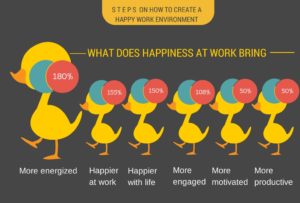
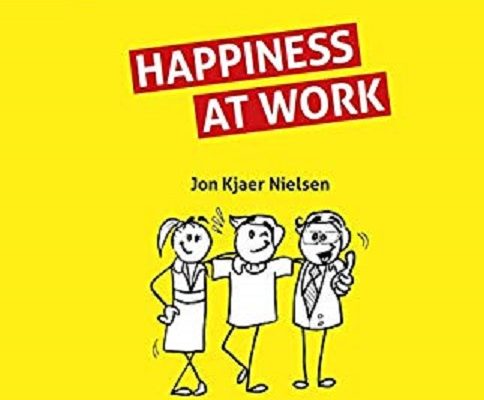
Why happy workplace matters and how to create a happy workplace?
Why happy workplace matters and how to create a happy workplace? To be on the winning edge in business, there should be happiness within the workplace for success to follow the footsteps of happiness.

“Whoever is happy will make others happy too.”
— Anne Frank
A happy workplace improves productivity. When there is a friendly atmosphere, work is no longer a necessity but a pleasure. But without even a shadow of a doubt, a happy workspace boosts employee outcome. And it works both ways. High productivity creates a happy workplace. And here’s why a happy workplace matters!

Why a happy workplace environment matters?
- A happy workplace contributes to the business’ success.
Since happiness helps to boost productivity, the employees’ performance is much more worthy. Both the company and employees benefit from a happy workplace.
- Employees are more effective.
When the work atmosphere is positive, the people work there also become positive. They feel secure in their job positions and know that others recognise their work. And when they feel admired, they are more willing to do their tasks.
- People like what they do and do what they like.
There’s nothing worse than doing something you feel not good at. It makes people feel like they are being tortured, and then their productivity falls to zero.
- Employees work better with others.
A happy workplace contributes to better communication in the organisation. Employees communicate better with each other as well as with clients. In general, everyone is happy!
- There are more energy and optimism.
People feel motivated to do their daily tasks. And even if there is a failure or a project goes wrong, everybody has high morale. People don’t give up; just keep going.
- Everybody is healthier.
Everybody is healthier, both physically and mentally. Everybody likes to wake up with the thought that the office will be filled with the aroma of fresh coffee and smiling people.
- People are more creative.
People want to make a difference and contribute to the success of the business. They get more ideas and are likely to implement great innovations into tasks and projects.
The team members make fewer mistakes and fix the issues instead of moaning about them.
“The simple act of paying positive attention to people has a great deal to do with productivity.” — Tom Peters
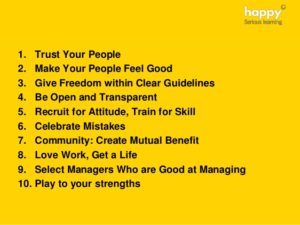
How to Create a Happy Workplace?
Improving workspace happiness is key to boosting the productivity of a business. Four factors need to be fulfilled to make people happy about their jobs. And they are self-realization and growth, connection and gratitude, a sense of optimism, and independence. Creating a happy workspace is not as difficult as it seems. Here are a few useful tips on how to do it.
- Appreciate your team individually.
Every employee wants to feel that their work matters. So, make sure that you actually pay attention to your team’s efforts. Appreciate them, give bonuses, say that you’re grateful for their work. It motivates them to do a more excellent job and will pay off in your firm’s success.
- Take care of your team.
Listen to their needs and complaints. Talk to your team about any potential problems to avoid future conflicts. Assign particular people to specific tasks and ensure they understand their work.
“To win in the market place you must first win in the workplace.”
— Doug Conant
- Invest in the growth of your team.
Improving the skills of your employees is the best thing you can do for them and your business. Send them to training sessions, hire a coach or provide somebody who would help them develop their strengths and fight with weaknesses.
- Create events.
Organise a fun and relaxing parties at the office in breaks between different tasks and projects. Go out once a week with your people for a drink or to the cinema. Such actions will strengthen the bond between employees.
- Keep your team healthy.
Pay attention to how many hours in a day they work. Don’t let them overwork. Ask if they need a few extra days off to take care of their family. Let them go home earlier if they are sick. It will pay off, and they will appreciate it.
If you implement the tips mentioned above in your work life, you can be sure positive vibes surround your employees.
“Happiness is when what you think, what you say and what you do are in Harmony.”
— Mahatma Gandhi

Why Having Strong Employee Relations is vital for your Organisation?

Having good employee relations is one of the vital aspects of a successful business plan in today’s date. It is like the mantra to keep your business on track is having good mutual understanding and sharing a strong bond with the employees. It is your employees who are responsible for everything that happens in the workplace.
However, the point for nurturing trust and understanding with your employees is to have a good relationship with them. It is known that if a healthy relationship is in place, employees will be more productive and more active. Thus they create less conflict and will be more loyal. Taking this into consideration, is your firm operating at its peak performance? Is that because you lack a strong relationship with your employees?

The Benefits of Strong Employment relations
Why Having Strong Employee Relations is vital for your Organisation? The benefits of having a bonded Strong Employee Relations and teamwork in a company.
Having a strong employer and employee relations reaps a lot of advantages for your business. The three most beneficial are listed below;
- Productivity
Strong employment relations generate a pleasant atmosphere within the work environment. It increases employee motivation and can also be increased through improved employee morale. Companies that have invested in employee relations programs have experienced increases in productivity. Therefore the enhanced productivity leads to improvements in profits for the business.
- Employee Loyalty
Creating a productive and pleasant work atmosphere has a drastic impact on an employee’s loyalty to the business. It encourages a loyal workforce. Having such a workforce enhances employee retention. It cut down the cost of recruitment, hiring and training drastically. For most business firms, the high cost of employee turnover surpasses the cost of the employee relations program that they have in place. Another advantage is that when the employee turnover is low, it assures that the employer has a trained and proficient set of employees.
- Conflict Reduction
When a work environment is dynamic and friendly, the extent of dispute within the workspace gets reduced. Fewer friction results in the employees being able to focus on the tasks at hand and they are therefore more productive.

How to achieve Strong Employee Relations?
So how exactly is a healthy employer-employee relationship developed? The first implicating factor is proper management. You may ask why? An employee who admires their employer is more likely to over-achieve in their assigned duties; this creates a goal-setting environment where the productivity levels are high. So how exactly does one perfect proper management? Below is an outline of five factors that are useful in the practice of good management.
Ask yourself these questions for motivating your employees
- Why are they there? (Don’t assume it’s money, people look for other factors too)
- What keeps them loyal to your company?
Now you can get to know the current motivation of your team and continue to motivate them further through incentives and encouragement. Encouragement can be accomplished simply through appreciating your workers every once in a while, both privately and publicly. It is well-known throughout all levels of management that happy employees are more productive.
- Set Goals
Achieving strong employer-employee relations also provide your employees with the image of goals and success. A saying that you should consider is ‘Under-promise and Over-deliver’. This phrase is a great managerial mantra. Consider this;
- Do you want to be a person who has wildly optimistic goals that your employees never meet?
- Or do you want to be a person who sets measured goals and ends up exceeding them by leaps and bounds?
Although it is focused on the image, it also is focused on reputation. These are essential when seeking respect from your team.
- Delegate
Delegation of tasks is essential for every business. Through delegation, you are taking a chance to teach and empower your employees. It also lets you and your team members understand their strengths and weaknesses.
- Allocate tasks that challenge your employees
- Assume responsibility for the mistakes of your employees
- Do not take credit for their achievements
- Accept your mistakes
These are a few useful points to consider when delegating tasks.
- Communicate with them effectively
When creating a work environment with a powerful communication network, there is one crucial vital factor. It is to ‘Keep your door open’. Remind and reinforce regularly that your door is always open to any queries or concerns. As an employer, you should be willing and ready to listen. Keeping an open channel of communication will make you aware of problems instantly, which is helpful for a quick resolution.
- Embracing Equality
Most people aren’t into equality as they would like to believe they are. In some cases, favouritism can be subconscious. But by welcoming equality for all employees will produce a fair and equal workplace environment for all. If every employee feels equal and essential, they are more likely to work harder and be more productive.
‘A happy workforce is a productive workforce’. An efficient work environment with good management and a robust employer-employee relation can be the vital key to the success or flop of any businesses. Good luck.

What are the severe impacts of hiring wrong employees?
Hiring wrong employees can cost a company severely both on time and productivity. Hiring wrong employees will be a burden to the concern in the long run affecting the profitability.

So have you decided to hire a new employee? It involves advertising the role, identifying the right-fit candidates, carrying out interviews and then making your final selection. Having been impressed by a candidate during the hiring process, you offer them the job position and then look forward to seeing them with your team.
However, not too long after they join, it becomes clear there is a problem – you made a bad hire. Then, some consistent patterns start developing. For example, your new hire misses deadlines, falls out with colleagues, ignores the firm’s values and mission, and only does the bare minimum at work. Then you will think back to when you meet them in the interview day and what hints might have appeared that perhaps you didn’t notice or ignored.
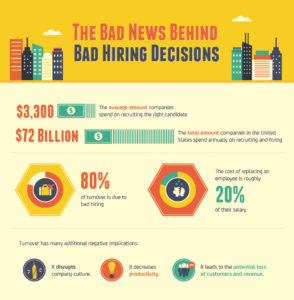
Why it’s essential to recruit the best
Your business loses more time, money and effort by hiring, and training the wrong people. You must also deal with all the havoc that the “wrong” employee creates. You may lose the business when that individual associates with customers. The expense you incur when you have to redo procedures that were handled ineptly and the pressures on other people who must pick up the slack. But the damage a bad hire can create doesn’t end there.
Consider the hassle and expense that you face when you have to cut your impairments and replace this “wrong” hire. It’s more difficult for the employer and team to accommodate a poor performer than it is to invest in recruiting quality candidates.
The wisest recruiting advice put in the time and effort on the front end is to ensure you have the best available pool of candidates for every job opening. And ascertain whether you have good procedures in place for assessing candidates.
The cost of a bad hire
A wrong hire may be unavoidable; sometimes, candidates can have excellent CVs and interview brilliantly but may not be apt for the job role. Nonetheless, a mistake can cause severe problems for the company. Here are the three consequences your firm may encounter:

Three consequences your firm may encounter
- Lost productivity
If you hire a wrong candidate, and the employee can’t do their tasks effectively, it means you have wasted time. The company may be spending the same amount of resources in the staff member but seeing significantly less output in return. Over some time, it can have a real impact on results and your team’s overall performance.
When encountered with a struggling colleague, other employees may start other duties which aren’t really in their job description. It not only impacts their productivity and performance at work but their ability to keep appointments, hit targets and maintain standards.
- Lower staff morale
If a wrong hire is working at below capacity due to a lack of skills or motivation, it can quickly have a knock-on effect on the remaining employees. One of the first things to take a hit, maybe staff morale. If you continuously ask your team to do more to cover for their struggling colleague, yet still receive the same salary, it can lead to tension followed by potential conflicts.
A lousy employee who has a negative attitude towards work can have a knock-on impact on staff morale. If they are unable to cope up seamlessly into existing teams and get on with their colleagues. It can surely ruin the positive atmosphere in the office. It potentially affects how much employees relish doing their jobs, and the likelihood they will stay with the company for the long term.
- Monetary costs of finding a replacement
It costs money to hire employees and replace them. Organisations need to generate job descriptions, advertise roles, read through CVs and carry out interviews. All the while, they may be running short-staffed due to a lack of capacity in the company. Even after the new employee joins a firm, there is onboarding expense to consider, plus the fact that the recruit may not be as productive as the expertise person they replaced.
So, to overcome a wrong hiring mistake, it may be necessary to reallocate people and resources, invest in further training or the most serious instances, let the person go. Even then, there are further expenses to be acquired, in terms of re-recruiting for the position. Mostly you are back to square one, with a job post still to fill.
Hiring the right person
There is no doubt that poor hiring decisions can have long-term consequences for organisations and fixing a poor performing employee can take some time to set right. If you do end up with an inept employee, it’s essential to address the situation.
Organisations must take all reasonable steps to evade making hiring mistakes. Using a recruitment agency can help diminish the risks involved with bringing a wrong employee onboard. They use their knowledge of industry sectors, client requirements and candidate capabilities to help select the right candidate.
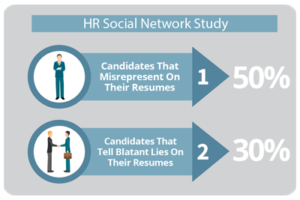

A few reasons why female boss is super awesome

The female boss is super awesome in most of the companies worldwide. It is proven fact women are far exceeding men in the growth of a concern.
Do you love or hate your female boss? Well, irrespective of your answer, there are many advantages of having a women boss that you might have overlooked. Your boss may be a Hitler or too bossy or too aggressive, but in certain ways they are awesome. Want to know how? Readout the blog and we are sure you will agree with us.

Why female boss is super awesome and the best boss?

- Women boss are more empathetic than a male boss
Women are more empathetic than men, and it has been proven in many instances. It is easier to confide in a female boss as she understands our circumstances in the same way as we feel it. They tend to provide a lot of chances to us. However, we mustn’t take undue advantage of this feature of a female boss. You can tell her that you need an off, and she will understand! They know the importance of professional and personal life balance.
- Unbiased judgements
Women are fairer when it comes to resolving official matters between employees or even between other managers. Women boss appreciates a hard worker and gives them opportunities to climb the ladder of success. Male bosses can be a lot partial in such cases. They like to support male employees or subordinate just because of gender. Unlike women bosses, some men are biased towards women because they look attractive. They consider hard work secondary.
- Amazing communicators
Women are always a better connector and communicator, whether in personal or official life. Women draw a line between personal and official life and do not cross it. They do not keep on talking about the stress in their life to everyone. They tend to be extra focused on their responsibility and don’t let sentiments come in between.
- Multi-tasking is so easy for women
Women tend to be more fast and organised compared to many male bosses, and they switch jobs quickly. You will see a female boss on a call, answering an urgent email and jotting down relevant points for the next meeting. Yes, it is easy for them, and we have seen men break down at those situations.
- Better leadership skills
Women take the initiative, they like to develop themselves and keep working on it, they display a high level of honesty and integrity, they are more result-oriented and last but not the least they crave to be a part of other’s growth.
- Women boss can be a good friend
Since they have characteristics like empathy and sympathy, they are good listeners. They also can be relied on in stressful situations. They can keep a secret and support you when you need it. However, you need to be right for her to support you. Then, she will stand by you when you are going through a tough phase.
- A perfect role model
Female bosses are one of the best role models you can have. She has struggled herself a lot to reach that position. She has worked hard against all the odds and proved herself. If you want to grow like her, you can just be with her to observe her and start climbing the ladder too!
- Women are the best in time management
Since women are excellent at multi-tasking and being organised at the same time, she will know the perfect way to manage time. It can be learnt by all employees and other colleagues who are in the office with her. You will see her fresh from the time she enters the office until the time she leaves the office.
Yes, woman bosses are ultimate. They are amazing and get the work done from anyone by hook or crook!


What are the best tips to consider when you get fired?

When you get fired from the workplace, it is the right signal to understand your in the wrong place at the wrong time. It is time to keep moving forward towards the right direction of passion in your Job.
Are you currently staring at your own pink slip or anticipating one soon? Then, you can take a tiny bit of comfort in knowing that you are not alone in the line of people who lost their job. If you have got fired, own it and accept the reality of the situation. Remind yourself that there is a lot of other fish in the job search sea and then get yourself and your resume back to the market, stronger than ever.

If you are like most people, you have a lot of questions for your employer.
- Am I eligible for unemployment?
- What happens if I have been wrongfully dismissed? What do I will say in my cover letters and job interviews?
Well, if you are worried about your job loss, this blog is the right one for you. Here we discuss what you need to know about your employee rights, your financial options, and your best path forward when you get fired or otherwise terminated from employment.

Tips to consider when you get fired
- Do This Right Now
When you have lost your job, it’s important to check right away on compensation due, benefits, references, and unemployment. Sometimes, you may get fired, and you haven’t been informed about the benefits. In such cases, contact the Human Resources department at your former employer to request the details on the status of your benefits.
It’s necessary to understand your rights when you quit your job. You need to know how you will get your final paycheck and what happens with your health benefits, pension or retirement plan, and so on.
- What to do in the days after your termination?
From the day you get fired, your focus will fluctuate between lots of questions such as
- I got fired. What will I do now?
- Is my career over.
It is better to set a good plan to keep yourself from getting lost in these queries or psyching yourself out.
- Things you should not say or do if you get fired
There is a right way to behave after getting discharged. There is a lot of stuff you should not say or do which lest you make a bad situation worse.
Coping up with the days after unemployment is difficult. But, never make a bad situation worse by doing or saying the wrong thing to the wrong people. It’s natural to feel angry, sad, and frustrated; just make sure to restrict negative comments and complaints to your employer, closest friends and family. Actions that you might take during your stressful days can be rash and have negative consequences if you aren’t very careful about what you say and do.
- Does your boss have to provide notice of termination?
Probably not. When an employee gets fired or laid-off, there are no federal regulations requiring employers to give advance notice unless the employee gets covered by an individual contract with the employer. If you are like the majority of workers, these probably don’t apply to you. It means your employer is free to fire you on the spot.
- Were you fired for cause?
When an employee gets terminated for cause, they are fired from their job position for a specific reason — for example, being chronically late, stealing, spending too much on social media, or having a bad attitude and so on. It’s essential to figure out whether you got fired for cause or you have been laid off.
- Can you collect unemployment?
Don’t think that being fired means that you are unfit for employment. Depending on the situations, you could still qualify. The exception is if you got fired for misbehaviour, but you can always apply because your perception of your work history may be distinct than your employer’s.
- What Is Wrongful Termination?
Wrongful termination happens when an employee gets discharged from employment for illegal reasons, or an employee gets fired when he violated the company policy. If you were wrongly terminated, you might be able to appeal the decision.
Many people experience an unexpected job loss. You can recover from this situation quickly if you respond gracefully and take action to advance your skills, update your CV and apply for new jobs.

End of content
No more pages to load




